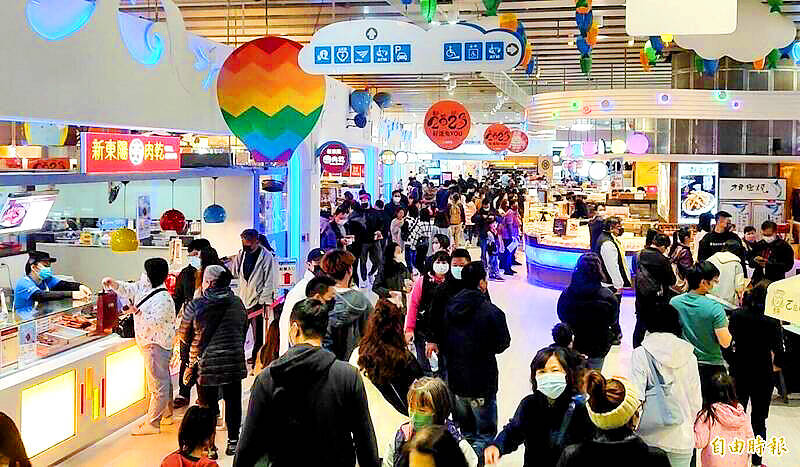Consumer confidence rose for the second consecutive month last month, indicating higher optimism over the economy, a National Central University survey released yesterday showed.
The consumer confidence index (CCI), compiled monthly by the university, rose 2.74 points from a month earlier to 62.47 last month.
It had fallen to 59.12 in December, its lowest level since hitting 56.45 in September 2009, but rebounded to 59.73 in January.

Photo: Hsu Tzu-ling, Taipei Times
Compared with the small rise in January, the bigger gains in last month’s index suggested a significant increase in consumer confidence, said Dachrahn Wu (吳大任), director of the university’s Research Center for Taiwan Economic Development.
The index gauges people’s confidence in the local economy, household finances, employment prospects, the stock market and consumer prices, as well as their confidence in making durable goods purchases over the next six months, the center said.
Last month’s survey — which polled 2,894 people over the age of 20 nationwide from Feb. 18 to Tuesday last week — showed improvements in all six subindices.
Among them, interest in durable goods purchases over the next six months gained the most, rising 7.45 points from a month earlier to 108.05.
It was followed by the subindex for confidence in the stock market, which rose 3.2 points to 24, and in employment prospects, up 2.05 points to 63.4.
A CCI index or subindex score of 0-100 indicates pessimism, while a score of 100-200 shows optimism, the university said.
The nation’s overall CCI has never reached 100, peaking at 92.93 in April 2015.
Despite the improvement, Wu said that with inflation still high in Western countries, and the US Federal Reserve and European Central Bank likely to raise interest rates, affecting global demand, Taiwan’s exports could be negatively affected and erode confidence in household finances and employment.
Last month’s survey had a confidence level of 95 percent and a margin of error of plus or minus-2 percentage points.

The US dollar was trading at NT$29.7 at 10am today on the Taipei Foreign Exchange, as the New Taiwan dollar gained NT$1.364 from the previous close last week. The NT dollar continued to rise today, after surging 3.07 percent on Friday. After opening at NT$30.91, the NT dollar gained more than NT$1 in just 15 minutes, briefly passing the NT$30 mark. Before the US Department of the Treasury's semi-annual currency report came out, expectations that the NT dollar would keep rising were already building. The NT dollar on Friday closed at NT$31.064, up by NT$0.953 — a 3.07 percent single-day gain. Today,

‘SHORT TERM’: The local currency would likely remain strong in the near term, driven by anticipated US trade pressure, capital inflows and expectations of a US Fed rate cut The US dollar is expected to fall below NT$30 in the near term, as traders anticipate increased pressure from Washington for Taiwan to allow the New Taiwan dollar to appreciate, Cathay United Bank (國泰世華銀行) chief economist Lin Chi-chao (林啟超) said. Following a sharp drop in the greenback against the NT dollar on Friday, Lin told the Central News Agency that the local currency is likely to remain strong in the short term, driven in part by market psychology surrounding anticipated US policy pressure. On Friday, the US dollar fell NT$0.953, or 3.07 percent, closing at NT$31.064 — its lowest level since Jan.

The New Taiwan dollar and Taiwanese stocks surged on signs that trade tensions between the world’s top two economies might start easing and as US tech earnings boosted the outlook of the nation’s semiconductor exports. The NT dollar strengthened as much as 3.8 percent versus the US dollar to 30.815, the biggest intraday gain since January 2011, closing at NT$31.064. The benchmark TAIEX jumped 2.73 percent to outperform the region’s equity gauges. Outlook for global trade improved after China said it is assessing possible trade talks with the US, providing a boost for the nation’s currency and shares. As the NT dollar

The Financial Supervisory Commission (FSC) yesterday met with some of the nation’s largest insurance companies as a skyrocketing New Taiwan dollar piles pressure on their hundreds of billions of dollars in US bond investments. The commission has asked some life insurance firms, among the biggest Asian holders of US debt, to discuss how the rapidly strengthening NT dollar has impacted their operations, people familiar with the matter said. The meeting took place as the NT dollar jumped as much as 5 percent yesterday, its biggest intraday gain in more than three decades. The local currency surged as exporters rushed to